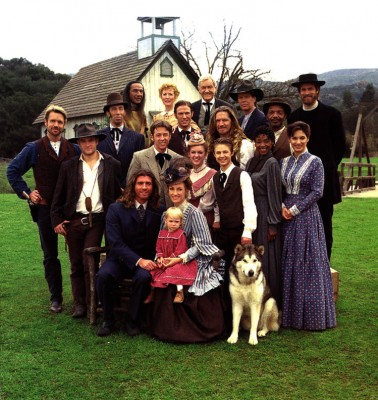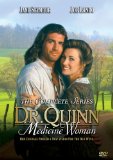| Reviews & Columns |
|
Reviews DVD TV on DVD Blu-ray 4K UHD International DVDs In Theaters Reviews by Studio Video Games Features Collector Series DVDs Easter Egg Database Interviews DVD Talk Radio Feature Articles Columns Anime Talk DVD Savant Horror DVDs The M.O.D. Squad Art House HD Talk Silent DVD
|
DVD Talk Forum |
|
|
| Resources |
|
DVD Price Search Customer Service #'s RCE Info Links |
|
Columns
|
|
|
Complete Series - Dr. Quinn, Medicine Woman, The
This reviewer never caught the show when it was new and, needless to say, I didn't get to watch all 150 episodes in the three weeks since it arrived at my doorstop, but having sampled representative and well-regarded shows from all six seasons, I think I have a pretty fair grasp of its strengths and weaknesses. Generally, it's a good show with much to recommend it and it's easy to see how when it was new it developed a passionate following, especially among middle-aged women - though in the big picture it does fall well short of greatness in curious ways.
Michaela Quinn (Jane Seymour), a rare female physician in 1867 Boston (the Female Medical College of Pennsylvania, the world's first for women, was established in 1850) accepts a job Out West in the pioneer community of Colorado Springs following the death of her doctor father. In the pilot, Michaela arrives only to learn the disappointed townsfolk were expecting a man - the telegraph operator wrongly assumed the "a" at the end of "Michaela" was a mistake - and rather than let a woman treat their various ailments the townsfolk would rather put their trust in Jake Slicker (Colm Meany in the pilot, Jim Knobeloch in the series) - the town barber who doubles as amateur physician and dentist.
Michaela's only allies are mountain man Sully (Joe Lando) and a no-nonsense midwife named Charlotte (Diane Ladd). Charlotte, however, is bitten by a rattlesnake and dies, leaving her three unhappy children - teenager Matthew (Chad Allen), Colleen (Erika Flores, later Jessica Bowman), and young Brian (Shawn Toovey) - in Michaela's care.
Predictably, early episodes revolve around the townsfolk's seemingly insurmountable reluctance and outright dismissive attitude toward Michaela and her practice. Besides hardheaded Jake, this resistance is symbolized by Michaela's contentious relationship with grocer Loren Bray (Orson Bean) and saloon and brothel owner Hank Lawson (William Shockley).
Dr. Quinn, Medicine Woman filled the void left by end-of-the-line ensemble Western series like Gunsmoke (particularly the later, hour shows from the 1970s), Little House on the Prairie, and wholesome family dramas (with a historical context) like The Waltons. It has many of the same advantages and disadvantages of those programs, the main difference being that where those shows generally got worse as they went along, Dr. Quinn actually seems to have improved over the course of its run. Its early teleplays paint its characters in the broadest of strokes but later on they're given three-dimensional layering not seen in the beginning.
Its determined, intelligent female lead character is appealing, while Michaela's series-long romance with mountain man Sully (peaking with a season three wedding special) probably limited its demographics because visually Sully is something straight out of a Harlequin romance novel - locked in a romantic embrace classically beautiful Seymour and muscular Lando - flowing locks and all - look exactly like a Harlequin cover, with Lando especially resembling popular model Fabio (Lanzoni). The ying-yang desire to do a straight, historically accurate Western series and a sweeping romantic melodrama about and for women is obvious. To its credit, most of the time Dr. Quinn succeeds in entertaining both rather segregated audiences, though ratings-wise the demographics were decidedly slanted toward the latter.
Part of my quandary with episodes of Dr. Quinn have to do with its 20-20 hindsight and persistent late-20th century perspective on mid-19th life. The show's hook of a pioneering female doctor in the Old West is a good and valid one, and that she's a progressive tenderfoot from Back East with social views at odds with her much more conservative neighbors is also interesting, but too often the writing carries this to an unbelievable PC extremes.
A sixth season episode called "Point Blank" is a good example of this. Michaela is seriously wounded when a stranger shoots her with his pistol at point-blank range, and what we now call post-traumatic stress triggers a reaction something akin to agoraphobia; Michaela is too terrified to step outside her own house; she won't even go near the innocuous family garden just a few feet outside her back door.
As drama, this is a perfectly fine show, but mental illnesses like agoraphobia are widely misunderstood even today, yet in this episode the entire town empathetically and patiently rallies to support Michaela's recovery. While that warm and fuzzy reaction seems appropriate to this series and its characters, it just doesn't seem believable in an early-1870s rural America setting.
Similarly, other shows grapple with issues like white racism toward Native Americans, toward former black slaves, toward homosexuals (in an episode featuring a visiting Walt Whitman) with the same late-20th century hindsight that, while appealingly progressive, is also distorted from historical reality. The broad strokes with which the writers paint Michaela's adversaries only accentuate this. Early on Slater is depicted as hopelessly naïve and rather stupid, grocer Loren Bray as incessantly curmudgeonly, and saloonkeeper Hank Lawson as a mean S.O.B. Gradually, their characters are softened up, with their function in the series largely replaced by a nasty, fussy and inflexible banker Preston A. Lodge III (Jason Leland Adams). For the most part, however, the characterizations are pretty monochromatic, though not as extreme as Little House on the Prairie's cartoony nemeses (Nellie and Mrs. Olson, etc.). This is the antithesis of shows like, say, Mad Men, which directs a historical perspective spotlight on an ensemble cast of characters where everyone is flawed precisely because they are the product of the less-enlightened times in which they exist.
Despite these complaints, I found myself enjoying Dr. Quinn more-and-more as I went along, especially with the 3rd-6th season shows. The storylines generally are predictable, but as TV comfort food they fit the bill. Seymour is an appealing actress, as is her unique genre character, and the rest of the cast is fine. As a fan of Western movies and TV shows (and not so much florid romantic melodramas) I was more intrigued by the classically Western drama episodes than the romance. One typically good example: In "Legend," neophyte sheriff Matthew (now a young man) is shot by a gang of ruthless bank robbers (in a clumsy coincidence of writing, the bullet nicks Matthew's cervical artery, the same spot where Michaela was shot in "Point Blank"). A legendary marshal played by Willie Nelson shows up, and Matthew insists on joining him. The episode is rather like Unforgiven-lite, but Nelson's naturalistic performance and some good ideas in the script raise it well above average.
Besides Nelson, Dr. Quinn offered an impressive array of guest stars. Gail Strickland, Barbara Babcock, Elinor Donahue, Michelle Bonilla, and John Schneider were regular or semi-regulars at various times. Other guest stars include Jane Wyman (as Michaela's mother), Johnny and June Carter Cash, Robert Culp, Kenny Rogers, Tom Poston, Anne Lockhart, Fred ("Mr.") Rogers, Denise Crosby, Barbara Mandrell, Ray Walston, David Ogden Stiers, David Carradine, James Keach (Seymour's real-life husband), Nick Tate, and Richard Roundtree.
Video & Audio
The Complete Series - Dr. Quinn, Medicine Woman essentially repackages the six season sets plus the half-size DVD containing the two TV-movies and sticks everything together into a sturdy box. The single-sided, dual-layer DVDs are all numbered, 1-42, and inside the first season case is an A-Z index of every episode (though I wish a chronological listed had also been included).
The full-frame transfers are okay. The pilot definitely seems to have been shot on film and finished on tape; footage from the pilot make up the singularly ugly-looking main titles for the series. After the video-looking pilot the picture quality improves substantially thereafter; apparently Dr. Quinn was one of the very few primetime network shows shot in Super-16 rather than standard 35mm. (Angenieux 11.5-138mm cameras were used.) Given that smaller gauge's limitations, the transfers are pretty good.
The show's Dolby Stereo mix is excellent, with a lot of grand sweep in its scores and aggressive directionality in its sound effects and even some dialogue, an aggressiveness common to early stereophonic network dramas. However, there are no subtitle or alternate audio options.
Extra Features
Supplements are identical to what was included in the 2003-2006 single-season sets, and are all pretty good, actually. Season 1 includes an episode from A&E Biography series, "Jane Seymour: Hollywood's English Rose," along with an Interactive Tour of 19th Century Colorado Springs.
Season 2 features an audio commentary by Joe Lando on the episode "Best Friends"; an 11-minute featurette about the series' origins, "Beginnings"; and "Boarding House: Guest Stars." Season 3 offers another commentary, this one featuring Jane Seymour and Lando on "For Better Or Worse," the highly rated wedding episode. Season 4 includes a 10-minute featurette with the cast recalling their "Favorites." Shawn Toovey and Chad Allen do an entertaining commentary on a Season 5 show, "Legend," while Seymour and James Keach discuss the Season 6 episode "Point Blank," which Keach directed. The final disc with the two TV movies includes a trivia quiz, and throughout the set are text cast biographies, photo galleries, and a list of the show's awards and other honors.
Parting Thoughts
While this reviewer wasn't quite totally enamored of Dr. Quinn, Medicine Woman, I found it generally a very pleasant show with an interesting premise and likeable characters. While occasionally a bit overripe character-wise and predictable, its attributes outweigh its shortcomings, and its passionate following is understandable. Meanwhile, A&E's DVD is a pretty decent bargain for hardcore fans of the show that want the entire series in a single, compact package. Recommended.
Stuart Galbraith IV's latest audio commentary, part of AnimEigo's forthcoming Tora-san DVD boxed set, is available for pre-order, while his latest book, Japanese Cinema, is in bookstores now.
|
| Popular Reviews |
| Sponsored Links |
|
|
| Sponsored Links |
|
|
| Release List | Reviews | Shop | Newsletter | Forum | DVD Giveaways | Blu-Ray | Advertise |
|
Copyright 2024 DVDTalk.com All Rights Reserved. Legal Info, Privacy Policy, Terms of Use,
Manage Preferences,
Your Privacy Choices | |||||||















